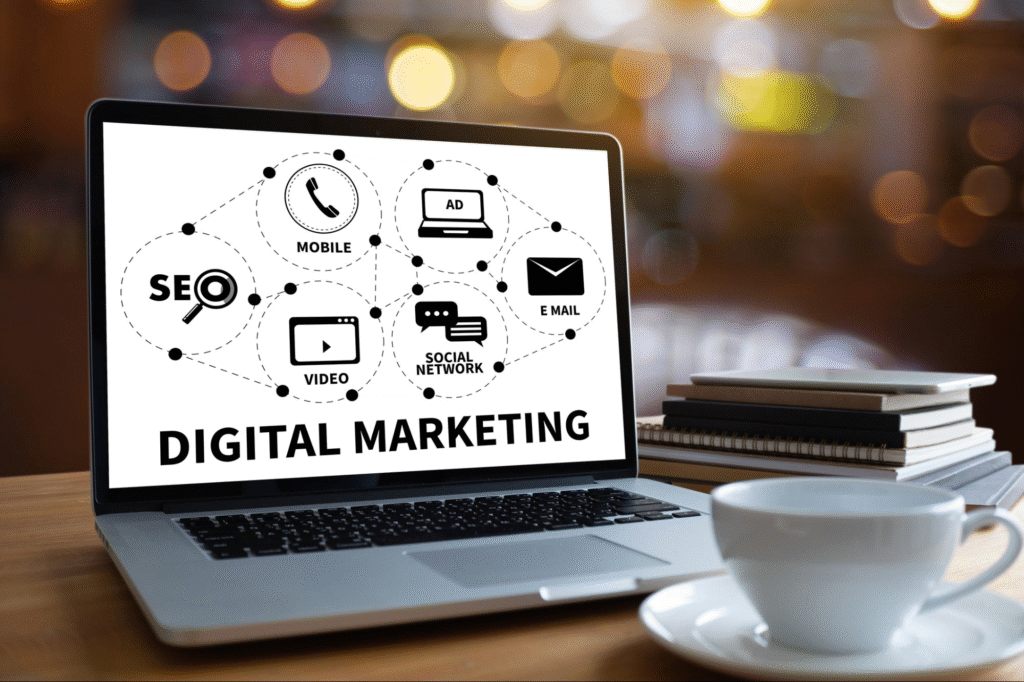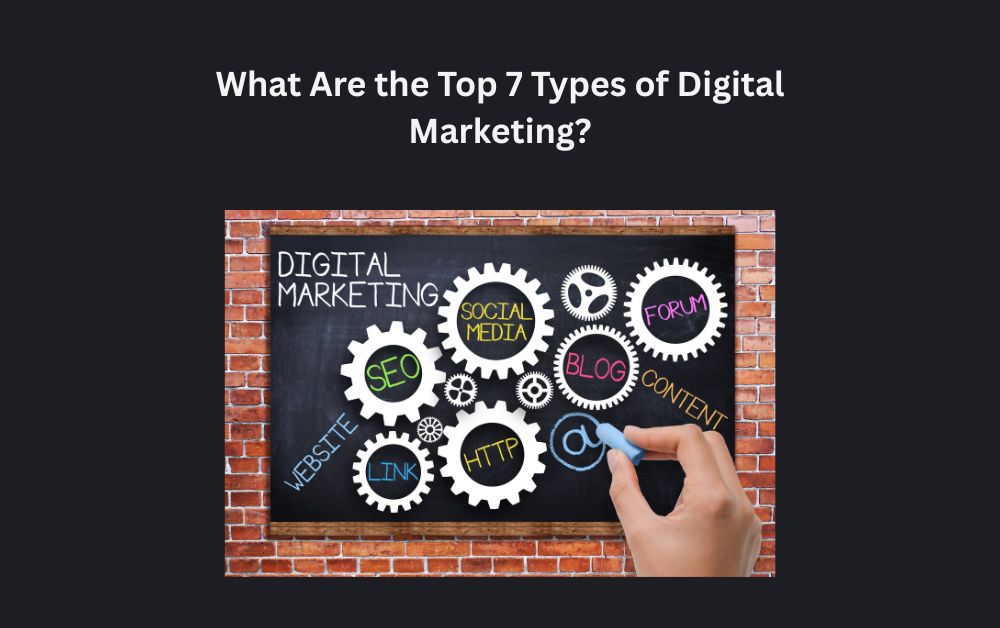In today’s digital age, almost everyone spends a lot of time online. Whether they are shopping, reading news, watching videos, or scrolling through social media, the internet has become a part of daily life. Because of this, businesses must focus on digital marketing to reach their audience where they already are — on the internet.
But digital marketing is not just one single method. It includes many different types. In this blog, we’ll explore the top 7 types of digital marketing, explain each one clearly, and help you understand how they can grow your business online.
Let’s dive in.
1. Search Engine Optimization (SEO)
What Is SEO?
SEO stands for Search Engine Optimization. It is the process of improving your website so that search engines like Google can better understand it and show it to more people when they search for related topics.
If your website appears on the first page of search results, more people will click on it. This means more visitors and potentially more customers.
Why Is SEO Important?
Most internet users click on one of the first few search results. If your business does not appear there, people may never see your website. Good SEO helps bring more visitors and builds trust with your audience because websites at the top are often seen as more reliable.
Types of SEO
- On-Page SEO: This includes improving your website content, using the right keywords, adding proper headings, and organizing your pages in a user-friendly way.
- Off-Page SEO: This focuses on building your website’s reputation through backlinks, which are links from other websites to yours.
- Technical SEO: This includes making your site fast, mobile-friendly, and secure (HTTPS), as well as making sure it can be crawled and indexed by search engines.
Note:- Ready to take your business online and reach more customers? Partner with a trusted Digital Marketing Company in Navi Mumbai that understands your goals and delivers real results. From SEO to social media, Aimbeat Technology offers complete solutions tailored to your business. Contact us today to grow your brand the smart way!

2. Social Media Marketing (SMM)
What Is Social Media Marketing?
Social Media Marketing is about promoting your business on platforms like Facebook, Instagram, Twitter, LinkedIn, and others. You create and share content such as posts, photos, videos, and stories to connect with your audience.
Why Use Social Media for Marketing?
People spend hours on social media every day. If your business is active there, you can build relationships, get feedback, and increase your brand’s visibility. Social media is also a great place to start conversations and grow your following.
Tools for Social Media Marketing
- Facebook Business Suite
- Instagram Insights
- LinkedIn Campaign Manager
- Canva (to design posts)
Best Practices for Social Media
- Be consistent with posting
- Use eye-catching visuals
- Respond to comments and messages
- Share helpful and interesting content
- Use relevant hashtags
3. Content Marketing
What Is Content Marketing?
Content Marketing is the process of creating and sharing valuable content that attracts and informs your audience. The goal is to build trust, provide value, and help people before asking for anything in return.
Why Does Content Marketing Work?
When people read your blogs, watch your videos, or download your guides, they begin to see you as an expert. This builds trust, and when they’re ready to make a purchase, they’re more likely to choose your business.
Types of Content You Can Create
- Blog articles
- Videos
- Infographics
- How-to guides
- Case studies
- Email newsletters
- Podcasts
Content marketing works best when it’s part of a long-term plan to educate, engage, and convert your audience.
4. Email Marketing
What Is Email Marketing?
Email Marketing is when you send targeted emails to people who have shown interest in your business. These can include offers, news, updates, tips, or educational content.
Why Is Email Marketing So Effective?
It’s a direct line to your audience. It is affordable, personal, and measurable. You can reach hundreds or thousands of people at once and track how they interact with your messages.
Tips for Successful Email Marketing
- Always get permission before sending emails
- Write short and clear subject lines
- Offer something valuable in every email
- Include a call-to-action (CTA) like “Buy Now” or “Learn More”
- Keep your design clean and mobile-friendly
Common Types of Marketing Emails
- Welcome emails
- Discount offers
- Product updates
- Event invites
- Follow-up emails
- Newsletters
5. Pay-Per-Click Advertising (PPC)
What Is PPC?
PPC stands for Pay-Per-Click Advertising. It means placing ads online and only paying when someone clicks on your ad. Google Ads and Facebook Ads are two popular PPC platforms.
Why Use PPC?
PPC allows you to get quick results. It’s a good choice when you want immediate traffic or to promote a new product or offer. You can control your budget and target a very specific audience.
Where Can You Run PPC Ads?
- Google Search Ads
- Google Display Ads
- YouTube Video Ads
- Facebook and Instagram Ads
- LinkedIn Ads
- Amazon Sponsored Products
Tips for Running a Successful PPC Campaign
- Research the right keywords
- Set daily or monthly budgets
- Write clear ad copy with a strong offer
- Use a strong call-to-action
- Monitor your ads and adjust as needed
6. Influencer Marketing
What Is Influencer Marketing?
Influencer Marketing is when a person with a large following on social media promotes your product or service. These influencers could be YouTubers, Instagram personalities, bloggers, or niche content creators.
Why Use Influencer Marketing?
People trust recommendations from those they follow. If an influencer they trust recommends your product, it can boost your credibility and bring in new customers quickly.
Benefits of Influencer Marketing
- Builds brand trust
- Reaches a wider audience
- Helps with product awareness
- Generates content for your own use
How to Work With Influencers
- Choose influencers whose followers match your target audience
- Set clear goals and expectations
- Offer fair compensation (money, products, or both)
- Track the results of each campaign
7. Affiliate Marketing
What Is Affiliate Marketing?
Affiliate Marketing is a performance-based strategy where people promote your product and earn a commission for each sale or lead they bring. This way, you only pay when you get results.
Why Choose Affiliate Marketing?
It’s a low-risk way to get more sales. You don’t have to hire a big marketing team. Instead, your affiliates act as your sales partners and help spread the word about your products or services.
Where Affiliate Marketing Happens
- Blogs and review websites
- YouTube product reviews
- Coupon and deal websites
- Email lists
- Social media channels
How to Set Up an Affiliate Program
- Use affiliate networks like ShareASale, CJ Affiliate, or set up your own system
- Offer competitive commission rates
- Provide marketing materials like banners, links, and product images
- Track performance and reward top affiliates
Summary Table: Top 7 Types of Digital Marketing
| Type of Digital Marketing | What It Does | Ideal For |
|---|---|---|
| Search Engine Optimization (SEO) | Improves website visibility in search engines | Long-term traffic |
| Social Media Marketing (SMM) | Promotes content on platforms like Facebook & Instagram | Brand building and engagement |
| Content Marketing | Builds trust through useful content | Educating and attracting customers |
| Email Marketing | Sends direct messages to a subscriber list | Customer retention and updates |
| Pay-Per-Click (PPC) Ads | Paid ads on search engines and social media | Quick traffic and leads |
| Influencer Marketing | Promotes products through social media influencers | Brand awareness and trust |
| Affiliate Marketing | Lets others earn by promoting your products | Low-cost sales generation |
Final Thoughts
Digital marketing offers many ways for businesses to connect with their audience. From SEO to social media, email campaigns, and influencer collaborations, each method has its strengths.
The key is to understand your audience, set clear goals, and choose the right mix of strategies for your business. You don’t need to do everything at once. Start small, test, and grow over time.
Digital marketing can help you build your brand, grow your customer base, and take your business to new heights.
For more insightful articles related to this topic, feel free to visit guest.blogrify.com









